Afghanistan Spotlight: The Importance of International Cooperation for Afghan Women and Girls
“Peace is not just silencing the guns.”
~ Fawzia Koofi, former Republic Peak Negotiator and first woman Deputy Speaker of Parliament in Afghanistan
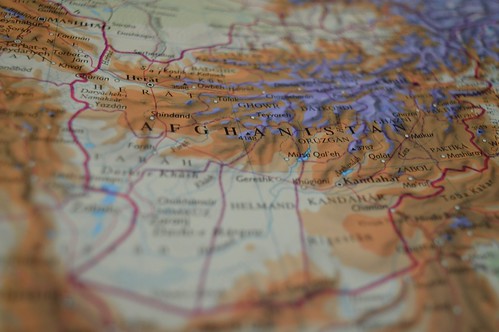
This article will focus on some of the events that have taken place since the Taliban took over Afghanistan, 30th September 2021, specifically highlighting the promises that have not been carried out by the Taliban government surrounding women’s education and jobs. I will also evidence the responses from the international community so far.
Three Months on
Three months after the Taliban seized power in Afghanistan, Afghan women continue to live in fear.
Despite many promises from the Taliban government suggesting that their rule will not reflect the same actions as their 1990’s regime, their measures so far suggest otherwise.
Women in Afghanistan continue to be banned from secondary schools, universities, and certain areas of work—and have been met with violence from the Taliban during protests in Kabul.
This trend further led to the banning of any demonstrations by the Taliban, resulting in fewer women attempting to take the streets, due to the fear of violence or potential death, forcing many women to flee the country for their safety.
While the Taliban have allowed some women to return to work in what they deem as essential jobs, like in hospitals and medical centres, women who work outside what is deemed as essential jobs continue to live in uncertainty.

Violence against Afghan women
November 6th 2021, women’s rights activist and economics lecturer Frozan Safi, 29, was found shot dead in Afghanistan after she had been missing since 20th October 2021.
Her body was found in the city of Mazar-i-Sharif and identified by her sister Rita, who is a doctor. In an interview, Rita stated, “We recognised her by her clothes. Bullets had destroyed her face.”
Frozan Safi is believed to be the first killing of a women’s rights activist in Afghanistan since the Taliban takeover. It is believed that Ms Safi had requested asylum in Germany, so when she received an anonymous call to gather her work and evidence to escape, she was not surprised. Since her disappearance on 20thOctober 2021, her family had no communication with her or her whereabouts.
While the people responsible for her death have not been identified yet, reports surrounding the actions of the Taliban so far and the feeling from activists that they are being hunted down, suggests that this could have been a targeted killing.
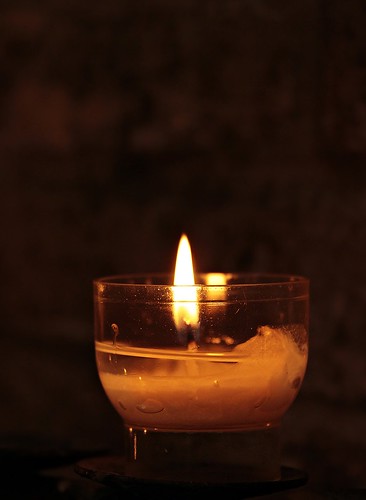
What’s Being Done?
Men talking about women’s rights
On the 5th October, Turkmenistan, UNICEF, the United Kingdom, the UNDP, at least 9 other countries, and 4 other humanitarian and development organisations all sent male delegates to meet with the Taliban administration in Kabul.
The question needs to be raised as to why only men are having conversations about women’s rights in Afghanistan?
Since 18th September, when the Taliban administration allowed boys to return to elementary school, there has been no further development of women’s education in Afghanistan. Girls have still not been allowed to return to school/education for the past 2 months.

While some universities have been permitted to allow female students back, the Taliban administration has enforced strict restrictions on female students—and further enforced strict gender segregation for both students and professors.
Afghan Women Address the UN
On 21st October 2021, The UN facilitated a series of events in which Afghan women could speak in New York on the sidelines of the UN Security Council Open Debate on Women, Peace and Security. The delegation included parliamentarians, women’s rights advocates, journalists, civil society leaders, and researchers. Afghan women leaders and human rights defenders addressed the press outside of the UN Security Council chambers.
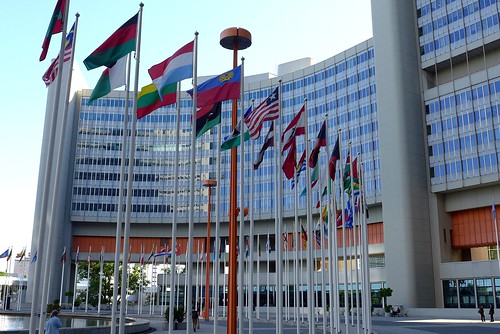
Throughout their address, they stated that, “Economic collapse is obvious, and it is a human rights issue because, if it happens, it will collapse on the shoulders of the women of Afghanistan. ”
Fawzia Koofi, former Republic Peak Negotiator and first woman Deputy Speaker of Parliament in Afghanistan, stated that “this situation could have been avoided and that we have all failed Afghanistan,” which sends a very powerful message to the member states. She further urged member states to act quickly, as there are no current human rights being upheld in Afghanistan.
When addressing the UN Security Council, Fawzia Koofi also highlighted that the Taliban are desperate to be recognised by the international community...and by not recognising their illegal takeover, the member states hold the power.
She emphasised that they have not delivered any sort of governmental plan since they took over, 30th September. Therefore, she suggested that the international community have aid, money, and recognition of their power and leverage over the Taliban regime. She suggested that this could lead to ensuring inclusion and respect to women’s rights in Afghanistan by the international community. She further emphasized that this is a shared responsibility.

Also speaking was Asila Wardak, former Afghanistan Diplomat, stated that it is necessary that the international community engages with the Taliban, as they are currently the ones in power. She further suggested that if they are going to give the Taliban a seat in the UN, then there needs to be conditions, specifically in terms of recognising the Taliban government.
The Afghan women’s address to the security council finished with a plea for the international community to ensure that the Taliban follow through on the promises they made when they took power, specifically regarding women’s education and jobs.
“They need to pressurise the Taliban to put their words into action.”
The people of Afghanistan, especially the women, deserve a better government.

International Help
At the end of October, the International Bar Association’s Human Rights Institute helped to organise the evacuation of 370 people, out of which 79 were female judges, journalists, and human rights activists.
They were evacuated from Afghanistan to Greece after citizens, especially activists, were warned they were at risk of being killed by the Taliban.
Under the new Taliban regime, thousands of prisoners, including terrorists and senior al Qaeda operatives that were convicted by some of the judges fleeing, have been released back into society, leaving citizens, especially women, terrified for their safety.
The Greek government is currently providing these evacuees with temporary visas. However, until they can get full visas, they will not be able to rebuild their lives. Furthermore, the International Bar Association’s Human Rights Institute has called on other nations to aid Afghan women by providing them with resettlement.

What can we do?
There are many ways in which we can show our support for Afghan women and girls. Through listening and learning, we can help to ensure that the Women of Afghanistan are heard.
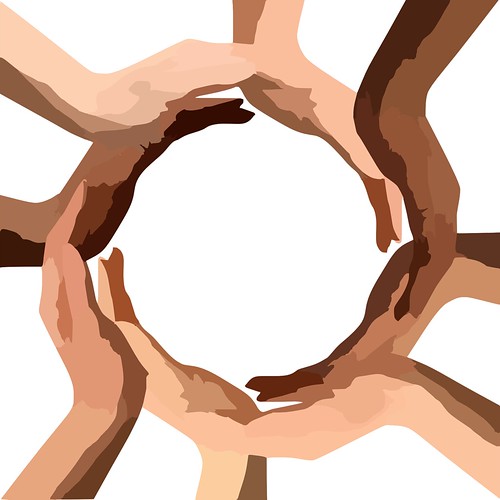
Sharing Afghan women’s social media posts is an extremely effective way of creating support and awareness.
Some platforms you can follow:
https://www.instagram.com/fawziakoofi77/
https://www.instagram.com/womenforafghanwomen/
https://www.instagram.com/unicefafghanistan/
You can also donate to organisations who are providing help for Afghan women and children:
Women For Afghan Women (WAW)
https://womenforafghanwomen.org/get-involved/
The Women’s Peace and Humanitarian Fund (WPHF)
https://wphfund.org/donate/
Afghanaid
https://www.afghanaid.org.uk/
Global Fund for Women
https://www.globalfundforwomen.org/
Afghanistan Spotlight articles in this series:
Women’s Human Right to Education in Afghanistan
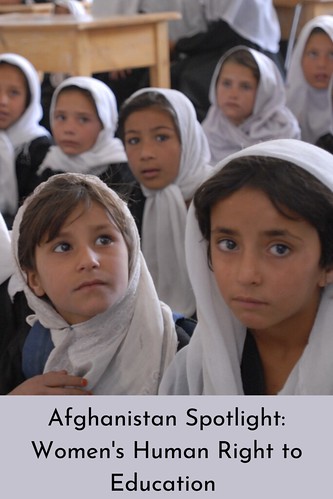
Afghanistan Spotlight: Historical Context and Transnational Feminism for Afghan Women
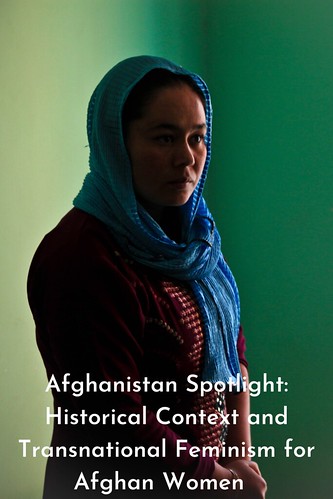
Olivia Fraser is the Women and Children’s Human Rights Editor at Wandering Educators. She is currently studying a Master’s in Human Rights and Diplomacy at the University of Stirling. She is motivated by a desire to emphasise the importance of women’s human rights.






















